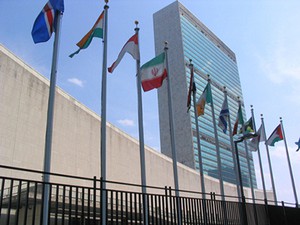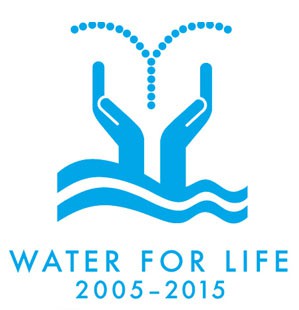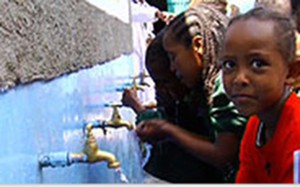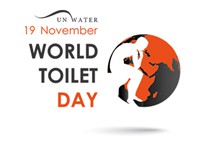WASH-related international initiatives
Meanwhile, the concern for WASH improvements has been growing globally (especially in low-income countries) and several initiatives in the forms of declarations, conventions, resolutions, protocols and commitments have been ratified internationally.
Which WASH-related international initiative have you already read about?
Millennium Development Goals, which set a target to halve the number of people without access to safe water and sanitation by 2015.
Conventions, protocols and resolutions
Over the past few decades, there have been several initiatives emanating from the United Nations (Figure 3.3), which have been enacted in terms of conventions, protocols and resolutions. These have mainly focused on ensuring people’s rights to water and sanitation and addressing the WASH needs of disadvantaged and marginalised groups of people.

Figure 3.3 United Nations headquarters, New York.
Just some of these initiatives are briefly described below:
- In 1999, a United Nations Protocol on Water and Health stated in Article 5: ‘Equitable access to water, adequate in terms both of quantity and of quality, should be provided for all members of the population, especially those who suffer a disadvantage or social exclusion’ (UN, 1999).
- In December 2003, the United Nations General Assembly, proclaimed the period 2005–2015 to be the International Decade for Action ‘Water for Life’ (Figure 3.4). It focused on co-operation at all levels and on ‘action-oriented activities and policies that ensure the long-term sustainable management of water resources, in terms of both quantity and quality, and include measures to improve sanitation’ (UNDESA, n.d.).
- In 2010, according to the Statement on the Right to Sanitation of the UN Economic and Social Council: ‘States must ensure that everyone, without discrimination, has physical and affordable access to sanitation, in all spheres of life, which is safe, hygienic, secure, socially and culturally acceptable, provides privacy and ensures dignity’ (UN, 2010).
- In 2011, the United Nations Human Rights Council adopted the resolution, The human right to safe drinking water and sanitation. This followed the UN’s 2010 recognition of the human right to safe and clean drinking water and sanitation, affirming that this is ‘derived from the right to an adequate standard of living and inextricably related to the right to the highest attainable standard of physical and mental health, as well as the right to life and human dignity’ (UN, 2011).

Figure 3.4 International Decade for Action, Water for Life, 2005–2015.
Can you identify any recurring themes in these UN initiatives?
Two themes that appear more than once are statement that access to water is a human right and that access should be equally available to all people, regardless of their differences.
International events
In addition to these UN resolutions, various special international events have been dedicated to WASH-related issues. They are used to create public awareness of WASH and its significant contribution to the overall economic development of a country.
Global Handwashing Day (Figure 3.5) is an annual worldwide advocacy day dedicated to increasing awareness and understanding about the importance of handwashing with soap as an easy, effective, and affordable way to prevent diseases and save lives. Celebrated annually on 15 October, Global Handwashing Day is an opportunity to encourage people to wash their hands with soap at critical times.

Figure 3.5 Global Handwashing Day logo.
In Ethiopia, this event has been celebrated all over the country every year since 2005. In most cases, the celebration focuses on school children with the aim of embedding handwashing practice as part of their life skills (Figure 3.6).

Figure 3.6 Children at the Ginfle Primary Public School in Addis Ababa wash their hands with soap and water during their lunch break on Global Handwashing Day, 15 October 2012.
World Toilet Day (Figure 3.7) is dedicated to improving people’s access to, and proper use of, a toilet. It is a day to raise the public’s awareness of the importance of toilets in blocking faecal-oral disease transmission and the need for all people to have access to a toilet. World Toilet Day has been celebrated in Ethiopia every year on 19 November since 2012.

Figure 3.7 World Toilet Day logo.
World Water Day (Figure 3.8) is marked on 22 March. Since 1993 it has been celebrated around the world, every year focusing on a different issue of water supply and sanitation.

Figure 3.8 World Water Day logo.
In summary, the international initiatives and events that have been introduced and applied across many countries (including Ethiopia), have improved recognition of WASH among governments, decision makers, and practitioners. These events have raised public awareness and increased the commitment to take practical action at all levels, from families through to national government. In this way, the international and national initiatives have guided the formulation of the OWNP.